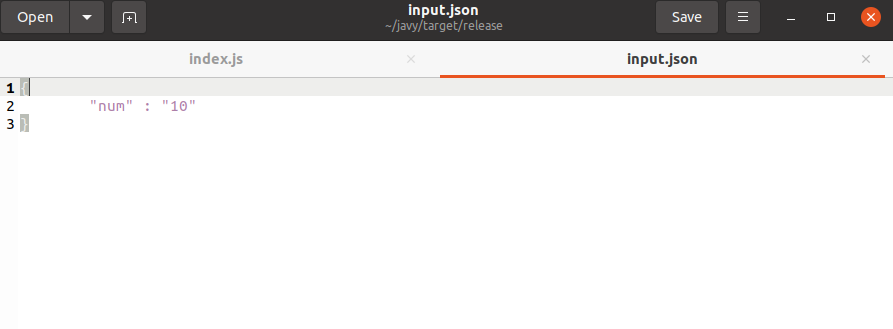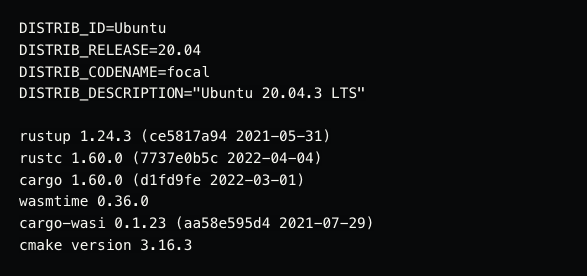Introduction: Run your JavaScript on WebAssembly. Javy takes your JavaScript code, and executes it in a WebAssembly embedded JavaScript runtime. Javy can create very small Wasm modules in the 1 to 16 KB range with use of dynamic linking. The default static linking produces modules that are at least 869 KB in size.
When running the official Javy binary on Linux, glibc 2.31 or greater must be available. You may need to update the version of your operating system if you are using an older version of glibc.
If you would like to use Javy for your own project but need to make some changes, read the extending Javy documentation for one approach to consider.
We welcome feedback, bug reports and bug fixes. We're also happy to discuss feature development but please discuss the features in an issue before contributing.
Read our contribution documentation for additional information on contributing to Javy.
- On Ubuntu,
sudo apt-get install curl pkg-config libssl-dev clang - rustup
- Stable Rust, installed via
rustup install stable && rustup default stable - wasm32-wasi, can be installed via
rustup target add wasm32-wasi - cmake, depending on your operating system and architecture, it might not be
installed by default. On MacOS it can be installed with
homebrewviabrew install cmake. On Ubuntu,sudo apt-get install cmake. - Rosetta 2 if running MacOS on Apple Silicon, can be installed via
softwareupdate --install-rosetta
- wasmtime-cli, can be installed via
cargo install wasmtime-cli(required forcargo-wasi) - cargo-wasi, can be installed via
cargo install cargo-wasi - cargo-hack, can be installed via
cargo +stable install cargo-hack --locked
Inside the Javy repository, run:
$ cargo build -p javy-core --target=wasm32-wasi -r
$ cargo build -p javy-cli -r
Alternatively if you want to install the Javy CLI globally, inside the Javy repository run:
$ cargo build -p javy-core --target=wasm32-wasi -r
$ cargo install --path crates/cli
If you are going to recompile frequently, you may want to prepend CARGO_PROFILE_RELEASE_LTO=off to cargo build for the CLI to speed up the build.
Pre-compiled binaries of the Javy CLI can be found on the releases page.
Javy supports ECMA2020 JavaScript. Javy does not provide support for NodeJS or CommonJS APIs.
Define your JavaScript like:
// Read input from stdin
const input = readInput();
// Call the function with the input
const result = foo(input);
// Write the result to stdout
writeOutput(result);
// The main function.
function foo(input) {
return { foo: input.n + 1, newBar: input.bar + "!" };
}
// Read input from stdin
function readInput() {
const chunkSize = 1024;
const inputChunks = [];
let totalBytes = 0;
// Read all the available bytes
while (1) {
const buffer = new Uint8Array(chunkSize);
// Stdin file descriptor
const fd = 0;
const bytesRead = Javy.IO.readSync(fd, buffer);
totalBytes += bytesRead;
if (bytesRead === 0) {
break;
}
inputChunks.push(buffer.subarray(0, bytesRead));
}
// Assemble input into a single Uint8Array
const { finalBuffer } = inputChunks.reduce((context, chunk) => {
context.finalBuffer.set(chunk, context.bufferOffset);
context.bufferOffset += chunk.length;
return context;
}, { bufferOffset: 0, finalBuffer: new Uint8Array(totalBytes) });
return JSON.parse(new TextDecoder().decode(finalBuffer));
}
// Write output to stdout
function writeOutput(output) {
const encodedOutput = new TextEncoder().encode(JSON.stringify(output));
const buffer = new Uint8Array(encodedOutput);
// Stdout file descriptor
const fd = 1;
Javy.IO.writeSync(fd, buffer);
}Create a WebAssembly binary from your JavaScript by:
javy compile index.js -o destination/index.wasmFor more information on the commands you can run javy --help
You can then execute your WebAssembly binary using a WebAssembly engine:
$ echo '{ "n": 2, "bar": "baz" }' | wasmtime index.wasm
{"foo":3,"newBar":"baz!"}% If you have a lot of JavaScript and you want to reduce compile times, try using the --no-source-compression flag. It will skip compressing the JavaScript source code when generating the Wasm module but will result in the Wasm module being larger.
javy compile index.js -o destination/index.wasm --no-source-compressionTo export exported JavaScript functions, you can pass a WIT file and WIT world when running javy compile. Only ESM exports are supported (that is, Node.js/CommonJS exports are not supported). For each exported JavaScript function, Javy will add an additional function export to the WebAssembly module. Exported functions with arguments and generators are not supported. Return values will also be dropped and not returned. The Wasm module generated is a core Wasm module, not a Wasm component.
An example looks like:
index.js:
export function foo() {
console.log("Hello from foo!");
}
console.log("Hello world!");index.wit:
package local:main;
world index-world {
export foo: func();
}
In the terminal:
$ javy compile index.js --wit index.wit -n index-world -o index.wasm
$ wasmtime run --invoke foo index.wasm
Hello world!
Hello from foo!The WIT package name and WIT world name do not matter as long as they are present and syntactically correct WIT (that is, it needs to be two names separated by a :). The name of the WIT world (that is, the value after world and before {) must be passed as the -n argument. The -n argument identifies the WIT world in the WIT file for the Wasm module generated by javy compile.
Exported function names with multiple words have to written in kebab-case in the WIT file (that is a restriction imposed by WIT), they are exported from the Wasm module as kebab-case to match the WIT, and Javy will match the WIT export to a JS export with the same name but in camel-case.
index.js:
export function fooBar() {
console.log("In foo-bar");
}index.wit:
package local:main;
world index {
export foo-bar: func();
}
In the terminal:
$ javy compile index.js --wit index.wit -n index -o index.wasm
$ wasmtime run --invoke foo-bar index.wasm
In foo-barExporting a function named default in the WIT world exports a function named default on the Wasm module and corresponds to either an exported default function or exported default arrow function in JS.
index.js:
export default function () {
console.log("In default");
}index.wit:
package local:main;
world index {
export default: func();
}
In the terminal:
$ javy compile index.js --wit index.wit -n index -o index.wasm
$ wasmtime run --invoke default index.wasm
In defaultYou can also export a default function by writing:
export default () => {
console.log("default");
}Javy-generated modules are by design WASI only and follow the command pattern. Any input must be passed via stdin and any output will be placed in stdout. This is especially important when invoking Javy modules from a custom embedding.
In a runtime like Wasmtime, wasmtime-wasi can be used to set the input and retrieve the output.
An important use for Javy is for when you may want or need to generate much smaller Wasm modules. Using the -d flag when invoking Javy will create a dynamically linked module which will have a much smaller file size than a statically linked module. Statically linked modules embed the JS engine inside the module while dynamically linked modules rely on Wasm imports to provide the JS engine. Dynamically linked modules have special requirements that statically linked modules do not and will not execute in WebAssembly runtimes that do not meet these requirements.
To successfully instantiate and run a dynamically linked Javy module, the execution environment must provide a javy_quickjs_provider_v1 namespace for importing that links to the exports provided by the javy_quickjs_provider.wasm module. Dynamically linked modules cannot be instantiated in environments that do not provide this import.
Dynamically linked Javy modules are tied to QuickJS since they use QuickJS's bytecode representation.
The javy_quickjs_provider.wasm module is available as an asset on the Javy release you are using. It can also be obtained by running javy emit-provider -o <path> to write the module into <path>.
$ echo 'console.log("hello world!");' > my_code.js
$ javy compile -d -o my_code.wasm my_code.js
$ javy emit-provider -o provider.wasm
$ wasmtime run --preload javy_quickjs_provider_v1=provider.wasm my_code.wasm
hello world!
The quickjs-wasm-rs crate that is part of this project can be used as part of a Rust crate targeting Wasm to customize how that Rust crate interacts with QuickJS. This may be useful when trying to use JavaScript inside a Wasm module and Javy does not fit your needs as quickjs-wasm-rs contains serializers that make it easier to send structured data (for example, strings or objects) between host code and Wasm code.
- Update the root
Cargo.tomlwith the new version - Create a tag for the new version like
v0.2.0
git tag v0.2.0
git push origin --tags
- Create a new release from the new tag in github here.
- A GitHub Action will trigger for
publish.ymlwhen a release is published (i.e. it doesn't run on drafts), creating the artifacts for downloading.







